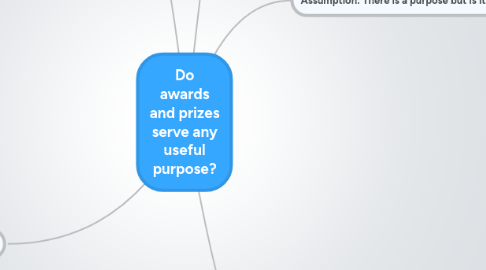
1. thesis statement
1.1. Although prizes and awards are implemented with the primary aim of motivating one to push themselves harder to success, there are undoubtedly several negative implications arise from it which cannot be overlooked.
2. No.
2.1. Compromise good values
2.1.1. Sake of prize and money not for the real purpose of doing it
2.1.2. Become obsessed with winning in pursuit of these prizes and awards
2.1.2.1. To the extent of resorting to underhanded means, cheating etc.
2.1.2.1.1. Sports
2.1.2.1.2. New node
2.2. Only one winner. those who join a competition but did not win any awards or prizes might feel dishearten
2.2.1. This aspect of award giving was clearly expressed byWinston Churchill in a House of Commons speech on March 22, 1944: A medal glitters, but it also casts a shadow. The task of drawing up regulations for such awards is one which does not admit of a perfect solution. It is not possible to satisfy everybody without running the risk of satisfying nobody. All that is possible is to give the greatest satisfaction to the greatest number and to hurt the feelings of the fewest.
2.3. Cash awards cheapen the intrinsic value to do good. Awards are given too freely, losing real purpose and meaning
2.3.1. Given a cash awards, it might raise citizens who expect cash prizes as award. students might conclude that showing kindness must be difficult
2.3.1.1. create in students a sense of entitlement: they may come to be expected to be pay for something that they should already be doing.
2.3.1.1.1. e.g Singapore Edusave Character award, cash sum of $200 to $500.
2.4. Complacency
3. Definitions
3.1. awards and prizes
3.1.1. Awards in the form of orders, medals, decorations, prizes, and titles are ubiquitous in monarchies and republics, private organizations, and not-for-profit and profit-oriented firms.
3.1.2. Given for excellence in various fields
3.1.2.1. National Awards
3.1.2.1.1. Academic(education)
3.1.2.1.2. Sport
3.1.2.1.3. Entertainment
3.1.2.2. international Awards
3.1.2.2.1. Humanitarianism, international relations, and service
3.1.2.2.2. Military and patriotic honors and medals
3.1.2.2.3. Science and technology
3.1.2.2.4. Entertainmnet
3.1.2.2.5. Education
3.1.2.2.6. Sports
3.1.2.3. School Awards
3.1.2.3.1. Academic
3.1.2.3.2. Non-academic
3.1.2.4. Community
3.1.2.5. New node
3.1.3. Non-monetary
3.1.4. Monetary
3.1.5. Effort
3.2. Useful Purpose
3.2.1. Practical outcome, benefit
4. yes. they do serve a useful purpose. (what and how is it useful) order of argument: EG -indiv/personal (academic) -community (sports) -national/international (entertainment)
4.1. build national pride, inspiration and offer encouragement to those who are still in the service. Harmonious society can progress better
4.1.1. Poltical Reasons/ National Interests
4.1.1.1. President Barack Obama indicated his respect for his peace prize by ramping up the military action in Afghanistan and by mendaciously avoiding his promised military pull-out from Iraq.
4.2. Sports
4.2.1. Prize money and the honour and prestige that come along with the award
4.2.1.1. Spur athletes to compete to the best of their abilities and hence intensifying the competition in their respective sport
4.2.1.1.1. Great source of entertainment and thrill for audience from highly competitive nature from sports
4.2.1.1.2. Increased viewership
4.2.1.1.3. Maximise potential
4.2.1.2. US Open Tennis Championships, USD 1.85-2.4 Million for the mens single champion.
4.2.1.3. Prizes attract good players
4.2.1.3.1. Want to be in the BEST in the field
4.3. recognition
4.3.1. incentive to strive for greater/continued success
4.3.1.1. 2011 Nobel Prize in Physics goes to Saul Perlmutter at the Lawrence Berkeley National Lab, Brian Schmidt at the Australian National Lab and Adam Reiss at Johns Hopkins.
4.3.1.1.1. This further motivated _______to study and do research.
4.3.2. to prove a political point
4.3.2.1. 2010, is the first time a Chinese has been awarded the Nobel Peace Prize. Despite having one-fifth of the world’s population, Chinese have garnered only 0.08 percent of Nobel Peace Prizes awarded. This year’s award goes to a Chinese who is critical of the system in China. Liu Xiaobo for his long and non-violent struggle for fundamental human rights in China.
4.3.2.1.1. China is thus internationally recognised as a country that struggles with human rights. Offers a platform for other countries such as USA to look deeper into this manifesting problem and find a solution. Hence, benefitting the Chinese citizens as they would have more freedom of speech and rights.
4.3.3. provide publicity for the nominees and winners
